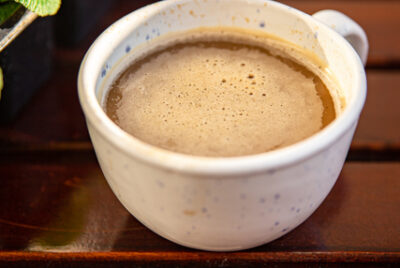Why Does My Pee Smell Like Coffee?
Hey fellow coffee lover! Ever wondered why, after enjoying your favorite brew, you’re greeted with that familiar coffee scent during your next bathroom visit? A reader sent in on this very subject, and to sum it all up, we were asked “Why does my pee smell like coffee?”
Let’s dive into the world of coffee and see how it interacts with our body.
Coffee Consumption and Its Impact
Coffee is not just a beverage; for many, it’s a ritual, a wake-up call, and a comforting routine. But while we relish its flavor and the boost it provides, coffee has various effects on our body, both immediate and long-term.
The Chemistry of Coffee
At its core, coffee is a complex brew with a plethora of compounds. Beyond just caffeine, it contains antioxidants, essential oils, and acids. Each of these compounds, when ingested, plays a role in the coffee experience and its after-effects.
Caffeine: The Wake-Up Call
Most people drink coffee for its caffeine content. It’s a central nervous system stimulant that can enhance alertness, reduce perceived fatigue, and improve concentration. However, its effects can vary based on one’s tolerance, the amount consumed, and individual sensitivity. For some, even a small amount can lead to jitters, anxiety, or disrupted sleep.
Antioxidants: Coffee’s Health Shield
Coffee is a significant source of antioxidants. These compounds combat free radicals in our body, potentially reducing the risk of certain diseases and slowing the aging process. Chlorogenic acid, a primary antioxidant in coffee, also has potential benefits for heart health and weight management.
Acidity and Digestion
Ever noticed a slight stomach upset after your coffee? Coffee’s natural acids can increase stomach acid production, which might lead to discomfort for some, especially those prone to conditions like acid reflux.
Diuretic Effects
Coffee increases urine production, leading some to believe it’s dehydrating. However, for regular drinkers, this diuretic effect is mild, and the water content in coffee can offset the potential fluid loss.
Interactions with Medications and Health Conditions
It’s essential to note that coffee can interact with specific medications or exacerbate certain health conditions. For instance, those with anxiety disorders might find that coffee amplifies their symptoms. Similarly, if you’re on medication for blood pressure, it’s wise to monitor how coffee affects you.
Factors Influencing the Coffee-Scented Pee
Our urine’s aroma post-coffee consumption can be a curious phenomenon. While the unique scent might raise an eyebrow or two, understanding the factors that influence this peculiar smell can shed light on the intricate dance between our body and our beloved brew.
Amount of Coffee Consumed
The quantity of coffee you sip matters:
High Concentration Brews:
Drinks like espressos or Turkish coffee, which have a robust coffee concentration, are more likely to result in a stronger urine smell.
Volume Matters:
The more cups you have during the day, the higher the chance your pee will bear its signature scent. This factor isn’t just about concentration but sheer volume too.
Individual Metabolic Rates
Each of us is unique, right down to how our bodies process what we consume:
Fast Metabolizers:
Some people have the genetic advantage (or disadvantage, in this case) of metabolizing substances rapidly. This speed might mean a quicker appearance of the coffee scent in urine.
Age Factor:
Metabolism generally slows down with age. An older person might notice a change in how their body processes coffee compared to their younger days.
Hydration Status
Water plays a crucial role in determining the concentration of our urine:
Dehydration:
If you’re not drinking enough water, the urine becomes more concentrated, making any odors, including that of coffee, more pronounced.
Overhydration:
Drinking excessive amounts of water can dilute the urine, potentially masking the coffee smell. However, it’s essential not to overdo it, as overhydration comes with its health risks.
Body Chemistry and Genetics
The way our bodies react to different foods and beverages is significantly influenced by our genetic makeup:
Enzyme Production:
Our bodies produce specific enzymes to break down compounds. Variations in these enzymes can affect how we metabolize coffee.
Odor Receptors:
Not everyone can detect the coffee-like scent in their urine. Some people might produce the aroma but lack the specific olfactory receptors to detect it.
Dietary Habits
What we eat alongside our coffee can either amplify or diminish the scent:
Food Pairings:
Consuming certain foods like spicy dishes or those rich in certain compounds alongside coffee might intensify the smell.
Alcohol and Other Beverages:
Alcohol can act as a diuretic, much like coffee. Combining the two might lead to a unique blend of odors in the urine.
In essence, several interplaying factors determine whether your pee takes on that coffee-like aroma post-consumption. Being aware of these factors can offer insights into this intriguing bodily response and perhaps even guide those looking to minimize the phenomenon.
Other Causes for Peculiar Pee Odor
While many of us associate a distinct aroma in urine with coffee consumption, various other factors can give our urine an unusual or strong scent. Understanding these causes can help individuals identify potential health or dietary concerns, and if required, seek appropriate medical intervention.
Dietary Choices
Certain foods can drastically influence the smell of urine:
Asparagus is renowned for its effect on urine smell due to the breakdown of asparagusic acid into sulfur-rich compounds.
Fish, particularly those like salmon and cod rich in choline, can result in a fishy urine aroma.
Fenugreek, both in culinary uses and as supplements, has the potential to give urine a maple-syrup scent.
Brussels Sprouts & Cabbage can introduce a sulfurous note to urine because of their sulfur compounds.
Hydration Levels
The level of hydration can also play a pivotal role:
Dehydration leads to concentrated urine, which can have a pronounced smell due to the increased concentration of waste products.
Medical Conditions
Various health conditions might be behind a peculiar urine aroma:
Urinary Tract Infections (UTIs) involve bacteria that can give urine an off-putting scent. Diabetes, when unmanaged, can lead to sweet-smelling urine due to excessive sugars.
Liver Problems might give the urine a sweet or musty note.
Phenylketonuria is a rare genetic condition causing a musty urine aroma due to the inability to process phenylalanine.
Trimethylaminuria is another uncommon condition where the body fails to break down trimethylamine, leading to a fishy scent.
Medications & Supplements
Some medications and supplements can alter urine’s scent:
Certain Antibiotics have the potential to change urine’s smell.
Overconsumption of Vitamin B6 Supplements can result in a unique odor.
And, there are Other Medications that can give the urine varied scents, ranging from popcorn to green tea to moldy.
Other Factors
Strenuous Exercise can, in some cases, lead to rhabdomyolysis. This condition involves the muscle tissue breakdown, releasing myoglobin, resulting in brownish urine with a potent, sweet scent.
Hormonal Changes during periods such as menstruation or pregnancy might also change the urine’s aroma.
Tips to Minimize Coffee Odor in Urine
The joys of sipping on a well-brewed cup of coffee can sometimes come with a minor side effect: a distinctive aroma in the urine. If you find this off-putting, here are several strategies to consider.
Increase Hydration
Drinking more water can help dilute the urine and the compounds responsible for the coffee scent. Maintaining consistent hydration throughout the day ensures that the body produces lighter and less concentrated urine.
Adjust Coffee Intake
If the scent in your urine after coffee consumption bothers you, consider reducing the number of cups you have daily. Instead of continuous sipping throughout the day, perhaps limit yourself to a cup or two in the morning. Additionally, you might want to try milder coffee blends or lighter roasts, which could contain fewer aromatic compounds influencing urine odor.
Diversify Your Diet
A well-rounded meal with your coffee can enhance the way your body processes its compounds. At the same time, you might want to avoid other strong-smelling foods, such as asparagus or fish, as they could add to the aromatic effects on your urine.
Change Your Brewing Method
Experimenting with different brewing methods might be helpful. Cold-brewed coffee, known for its smoothness and lower acidity, might contain fewer scent-causing compounds than its hot-brewed counterpart. Furthermore, using paper filters when brewing can trap some of the oils and compounds responsible for the strong odor.
Limit Additives
Sometimes, the culprit isn’t the coffee itself but the additives. Artificial sweeteners or flavors can amplify the smell. You might consider sticking to plain coffee or opting for natural sweeteners to curb the odor.
Frequent Bathroom Breaks
Regular visits to the restroom can ensure the faster expulsion of aromatic compounds, leading to a less potent-smelling urine. It’s advisable not to hold in urine for extended periods, as it can become more concentrated over time.
Consume Green Tea
Green tea, while acting as a diuretic similar to coffee, often doesn’t result in strong-smelling urine. By alternating between coffee and green tea, you might strike a balance between staying alert and reducing the aromatic impact on your urine.
Stay Physically Active
Physical activity can give your metabolism a boost, potentially helping in processing and eliminating certain compounds from your body more efficiently.
Consult a Nutritionist or Dietician
If you’re keen on finding a tailored solution, it might be worth consulting a professional. A nutritionist or dietician can provide personalized recommendations based on your specific body type and diet.
Why Does My Pee Smell Like Coffee? Conclusion
To answer, “why does my pee smell like coffee?”, put simply, because of the coffee you’re drinking! it’s a sign of true passion when even your pee reminds you of your beloved brew! Embrace it, understand it, and if needed, manage it. Happy brewing!
Why Does My Pee Smell Like Coffee? FAQ
Is it normal for my pee to smell like coffee after drinking it?
Yes, it’s a common phenomenon among coffee drinkers due to the body metabolizing its compounds.
Can other foods or drinks cause my urine to have a distinct smell?
Absolutely! Foods like asparagus, fish, and certain supplements can alter urine odor.
Does the smell indicate any health concerns?
Usually, no. However, sudden changes in urine odor or other symptoms should prompt a visit to a doctor.
How can I reduce the coffee odor in my pee?
Stay hydrated, limit coffee intake, and monitor other dietary factors that might intensify the smell.
Does everyone’s pee smell like coffee after they drink it?
Not everyone. It depends on factors like the amount consumed, metabolic rate, and hydration level.




